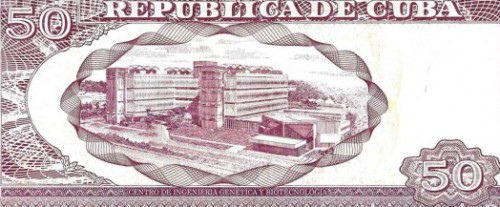Lichi en el Consejo de Estado, originally uploaded by orlandoluispardolazo.
www.penultimosdias.com/2011/08/05/leer-a-lichi-en-el-cons…
I’m guessing it was 1998. I am a biochemist and I was working then in a molecular genetics laboratory dedicated to the creation of recombinant vaccines for human use. Dengue, Hepatitis B and C, bacterial meningitis, HIV, and other such delicacies.
We were a good team. People of the First World in the Scientific Pole of Western Havana, in the sepia mass that appears on the back of the 50 peso bill: The Center for Genetic Engineering and Biotechnology (IGBC).
After studying at the Faculty of Biology with excellent professors but without a kilo or even a half-liter of moderately distilled water, the IGBC was the apotheosis of research freedom. Connected, of course, through Joseph Millar Barrueco at the Council of State, we had internet before the Cuban internet, we ran any kind of electrophoresis, we used radioisotopes and synthesized new biomolecules, all with reagents for the most part Made in USA and, more importantly for a voracious reader like me, thanks to the magazines of the day almost all Printed in USA (and reprints that, in particular, Yankee colleagues sent to us in Havana by courier).
In one of those cubicles on floor 7B, the report fell like a bombshell. The report against me, by Eliseo Alberto. I calculate it was in early 1998, more or less at the time of Pope John Paul II’s dizzying visit to the island (I listened, galvanized, to Pedro Meurice on one of those Saturdays working in my lab, comically called G-2*: Genetics-2).
The book, like many other publishing finds of the 1990s, came already dog-eared from being passed clandestinely from hand to hand. The name of Eliseo Diego meant very little to me then. And it would now be the dissident biography of his exiled son. Full stop.
So, with that insulting ignorance of professionals, we entered the tome. One by one, and always one at a time, cherished names that would remain forever on the tip of my tongue and whom I won’t mention while they are at risk of being accused of continuing to be my friend. We read, always stealing time from sleep, of the dawn of fermentation or Polymerase Chain Reaction or DNA sequencing, taking advantage of evening snacks, over-lighting and excessive air conditioning that had us living in an almost futuristic virtual reality, where the Special Period was just a nightmare exorcised by our electronic password at the gate. A sad nightmare like the death of that Eliseo Alberto, responsible now for fucking waking us up.
There was, of course, one who denied three times the prose of Lichi. And with all the reason in the world, as well. Because the Report against myself is in no way a credible text. Not even living it can one believe so much uncivil bestiality (the subtleties of State Security are worse than their summary trials and perpetual dungeons). There was one who stopped reading halfway through the book with inopportune ideological tears streaming down his face, unsuccessfully trying to defend the author (how can I not love such a vision). There was one who read it and smiled and remained mute (and still does as is his right). Two or three times we tried to comment on it cheerfully in some free time, checking the lists of exiles and foreign destinations to update them. And the debate continues. As citizens of the microworld of enzymes and plasmids, we were not prepared to politically debate much more.
Nor could we. Now, when a good share of those colleagues are living in exile I better understand why. Each drafted his own report against himself, against all of us. More than one vetoed living under the same roof with relatives as close as their parents, if they wanted to remain employed in the CIGB, because there was no confidence in their house in the “verification,” it could be contaminated there or be manipulated for revealing State secrets (I hope this paragraph is not doing so): in exchange the CIGB offered them an apartment provided just across the corner of 31st and 190th (after I decade I still remember the address, P. O. Box 6192). More than one was guilty of corresponding with the enemy. Many were expelled on accusations of being pornographers (sometime someone will have to explain the legal link in Cuba between pornography and counterrevolution), and of stealing private information (including using the grim technique of secret microphones).
Lichi died last weekend as if it were nothing. I’ve never again seen a copy of that book; yes, of his multiple novels in which, I confess, as with all Cuban fiction more or less well done, I don’t detect too much charm. I’m lonely as shit while typing these lines in the early morning hours with the old biotechnology habit of staying up late. But I don’t feel nostalgic nor anthropologically damaged, nor do I crave a more or less literary or liberating catharsis. I am free. More free than I ever dreamed in my carcinogenic gloves soaked in ethidium bromide or phosphorus alpha or polyacrylamide. Only, I ask myself, how many of my colleagues will remember me.
Orlando Luis Pardo Lazo
Havana
Translator’s note:
Cuba State Security is called “the G-2.”
August 5 2011

